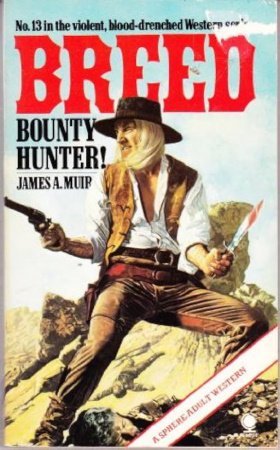‘What you want to know?’
‘There’s a man called Matthew Gunn,’ said Baum. ‘A half-breed. Called Azul, or Breed, too. Tall, blond. Wears buckskin pants an’ a leather vest. White shirt; black Stetson. Hair comes down to his shoulders. I heard you seen him in San Jacinto.’
‘Heard of him,’ said Gracey, ‘not done seen him. He was around there, though.’ He picked up the bottle and topped his own glass. ‘What’s it worth?’
‘That depends on you,’ said Baum. ‘It could be worth twenty dollars. Or your life.’
‘Jesus!’ Gracey swallowed hard, choking on the whiskey. ‘I only got it on hearsay. I wasn’t there when it happened.’
‘What happened?’ demanded Baum. ‘An’ remember a bullet don’t cost twenty bucks.’
‘Real big shoot up,’ said Gracey. ‘There was a double killing in a saloon. The Golden Goose. Two fellers got shot. One was Amos Dumfries’s son; the other was his top hand.’
‘Who’s Amos Dumfries?’ asked Baum.
‘Biggest goddam landowner in that area,’ said Gracey, nervously. ‘Rich an’ mean.’
‘Go on,’ said the German. ‘Tell me about it.’
‘Man that shot ’em answers your description,’ said Gracey. ‘But it don’t stop there. Seems like it all started when Wesley Dumfries took exception to some artist. The half-breed stepped in an’ shot Wesley. Then he shot Cole Turner. So Amos sent men lookin’ for them. The ’breed killed two an’ crippled as many more. Ran off their horses an’ rode away laughing.’
‘When you hear this?’ asked Baum.
‘Two weeks ago,’ said Gracey. ‘Last time I went through San Jacinto. Amos Dumfries was fixin’ the posses then gettin’ ready to hunt the ’breed down.’
‘How far’s this place?’ asked Baum. ‘San Jacinto?’
‘Two days ride, I guess,’ said Gracey ‘You want to buy me a drink?’
Baum dropped two five-dollar bills on the table and stood up.
‘Buy your own.’
‘You was talkin’ about twenty,’ complained Gracey. ‘An’ I give you what you wanted.’
‘You want to argue it?’ The German turned. ‘You want that?’
Charley Gracey shook his head. ‘Nossir. I don’t want to argue nothin’ with you.’
Baum nodded and went out through the
swinging doors. As they closed behind him Gracey muttered,
‘Bastard!’ But he kept his voice low.
A day and a half later Baum was in San Jacinto.
Amos Dumfries was in the Golden Goose, organizing the pursuit. He looked up as the big German came in and walked up to his table.
‘Name’s Baum,’ he said. ‘Fritz Baum. Maybe you heard of me?’
Dumfries nodded. ‘Ain’t you the feller Nathan Kellerman used to clear them Mexican sheepherders off his land?’
‘I worked for Mr. Kellerman,’ agreed Baum. ‘Now I’m working for someone else. Might tie in with what you’re doing.’
‘I’m just huntin’ the man who killed my son,’ said Dumfries. ‘Wesley an’ a few others.’
‘Big man?’ asked Baum. ‘A half-breed, with pale hair?’
‘That sounds like him,’ said the rancher. ‘You know him?’
‘He’s called Azul,’ said Baum. ‘Or Breed. Or Matthew Gunn. I been hired to find him.’
‘I’ll pay you the same price to lead me to him,’ said Dumfries. ‘As much again to see him hang.’
‘Man in Cinqua offered me a thousand to bring him in,’ said Baum. ‘He wants to kill him. You ready to top that?’
‘No.’ Dumfries shook his head. ‘That sounds too high. I got enough men I can find him myself.’
‘You ain’t done so good to now,’ said Baum. ‘You’re usin’ cowboys to do bounty work.’
‘All right,’ said Dumfries. ‘I’ll pay you five hundred to lead me to him. That guarantees I watch him die.’
‘You got a deal,’ said
Baum. ‘As soon as I got the money.’
Azul led Backenhauser into Placeras around midafternoon.
The town was quiet, most of its noise coming from the windmill that was clacking its fans around in the breeze that gifted power to the mill so that water was dripped slowly up into the cache tank. There was a stable and a hotel. A saloon, and a hardware store; a stage office. Nothing else, except sandy plain and the ominous bulk of the mountains.
They reined in outside the depot.
Inside was an old man with white hair and a whiter beard. He looked up as they approached the desk, and spat a long stream of tobacco juice into a spittoon.

























